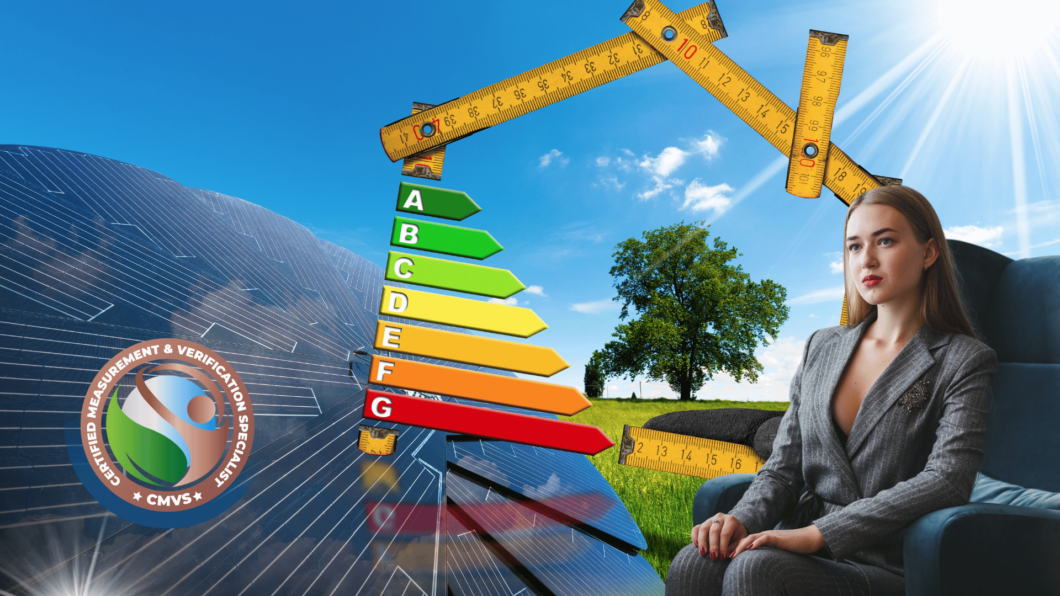Performance Measurement and Verification Analyst – PMVA Exam Prep

The Performance Measurement and Verification Analyst (PMVA) credential serves as the principal benchmark for individuals using performance, measurement, and verification principles in energy efficiency projects. Generally, ESCOs, public administration, utilities, and financial organizations utilize PMVs in an analytical role.
They oversee the design and execution of energy efficiency programs and the funding of energy efficiency initiatives. They have demonstrated measurement and verification capabilities, encompassing a thorough understanding of the use of the International Performance Measurement and Verification Protocol to determine savings. PMVs may comprise building technicians, HVAC specialists, engineers, architects, economists, financial analysts, and others.
Who are Performance Measurement and Verification Analysts?
- Energy managers evaluate energy savings.
- Consultants specialized in enhancing a client’s energy performance
- Building owners and managers understand energy savings financing.
- They are either designers of industrial processes or developers of new construction.
The Performance Measurement and Verification Analyst (PMVA) Exam Prep training program educates students on various situations, practical issues, system boundaries, baseline considerations, load shapes, statistics, fieldwork, OSHA, NFPA, data accessibility, reporting on M&V projects, IPMVP options, the future of measurement and verification, sample plans, and ESCO’s Guide.
Key Learning Objectives:
- Key concepts and contexts.
- Standards of Practice and M&V planning.
- Critical issues in M&V.
- Practical considerations for M&V
- Physical and statistical models.
- System boundary in M&V.
- Baseline model implementation and reporting period data.
- Granularity and load shapes.
- Using statistics for uncertainty communication.
- Metering and calibration of instruments
- Data accessibility, communication, and valuation.
- Reporting on M&V projects.
- Retrofit isolation details.
- Future of measurement and verification.
- PMVA Practice Test V.5.1 (Performance M&V Analyst)
A performance measurement and verification analyst is someone who uses the ideas of measurement and verification to figure out how energy management activities improve the performance of a wide range of systems that use energy, such as buildings or industrial processes.
The Performance Measurement and Verification Analyst (PMVA) Exam Prep training program provides comprehensive knowledge on measurement and verification principles, energy savings, benefits, credentials, key concepts, and contexts. It covers standards of practice, critical issues, physical and statistical models, system boundaries, baseline model implementation, and reporting on M&V projects. The program also includes a PMVA Practice Test V.5.1 and exam sample questions from industry experts.
What Does a Performance Measurement and Verification Analyst Do?
The individual oversees globally acknowledged techniques to measure the effects of energy consumption.
- Apply performance and savings verification concepts in various contexts.
- Clear communication with project partners helps companies implement cost-saving activities.
Krishnaji Pawar, CEO and founder of Beyond Smart Cities, is creating the Performance Measurement and Verification Analyst—PMVA Exam Prep training course, specializing in sustainable design strategies for green building certification systems, energy management, energy audits, building commissioning, and environmental impact assessments.
The PMVA Certification certifies an individual’s understanding of M&V theory implementation and enhances professional standards in energy efficiency and performance measurement and verification.
The certification includes a 100-question practice exam and unique tools to help energy management professionals create customized study plans and achieve professional development goals. These tools ensure the effectiveness of measurement and verification specialists.
PMVA Certification Value
- It enhances career prospects through higher pay, increased responsibilities, and benefits.
- We provide the knowledge and technical application of energy management, measurement, verification, and efficiency processes.
- Prioritizes professional growth and development.
- Enhances professional credibility.
- Increases job opportunities.
Other Related courses
Performance Measurement and Verification Analyst – PMVA Exam Question Bank
The Performance Measurement and Verification Analyst – PMVA Exam Question Bank, despite its 500-question practice exam with flash cards, aids Performance Measurement and Verification professionals in creating a personalized study plan to achieve their professional development goals.
Key Learning Objectives
- Over 500 questions in five practice exams.
- Understanding fundamental principles of M&V for energy efficiency and water protects
- Recognizing strategies and making smart choices.
- Experimenting with PMVA exam.
- Knowing how to respond to circumstances.
- Consideration of practice test as part of education.
- New PMVA: 162+ Key Terminology Flash Cards.
Measurement and Verification Fundamentals
The course on Measurement and Verification Fundamentals presents the fundamental M&V concepts and describes the impacts and roles of each M&V step. Throughout the course, practical examples are provided to increase participant comprehension.
Key Learning Objectives
- Introduction and general outline of course.
- Understanding of M&V process.
- Purpose of M&V: Fundamental principles.
- Energy Efficiency Performance M&V Certification Programs.
Measurement and Verification Plan Essentials
The Measurement and Verification Plan Essentials program offers statistical tools, examples, and case studies to enhance knowledge of the M&V process and plan development or interpretation.
Key Learning Objectives
- Fundamentals of M&V in Energy Efficiency Projects
- Fundamental Factors Driving Energy Savings
- Steps to Determine and Verify Savings
- Why do the M&V Plan?
- Steps to a M&V Plan
- Contents of the M&V Plan
Innovative Measurement and Verification
The Innovative Measurement and Verification training program provides hands-on exercises and concepts that complement and reinforce theoretical knowledge acquired through common M&V certification courses and designation for those who want to learn advanced M&V concepts.
Key Learning Objectives
- Measurement & Verification Overview.
- Fundamental factors driving energy savings.
- IPMVP Methodology and Measurement Options.
- Innovative M&V Tools and Methods.
- Best Practice Implementation.
- Outline of M&V Plan & Sample.





